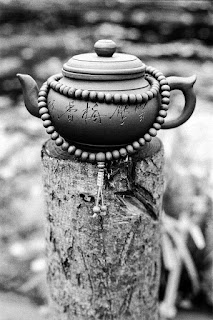Prayer Beads and Samosas
The man appeared suddenly at the
door calling to her Mataji! In that
age and place calling an older woman by her name would have been considered
loutish, even insulting. He was addressing my grandmother who sat cooking at a
coal-fired stove, prayer beads in hand, reciting from her prayer book, with her
dupatta covering her head. She always
prayed as she cooked.
It was summer and my family was visiting my grandmother in Haridwar, a small town where the Ganga gushes into the plains of north India. We sat on the floor of her spacious kitchen that doubled as a dining space, eagerly awaiting lunch. She was sitting on a low stool stirring a very large pot of lentils with her right hand. Her other hand continued its hypnotic course over the prayer beads. She would put down her beads from time to time, but I was sure she never lost her spot in the count when she resumed.
When the young man spoke, she slowly turned towards him. My father made a move to stand up at the sight of a stranger inside the house, but she motioned for him to stay put. The young man stood in the outer doorway to the kitchen. He repeated urgently, “Mataji, may I speak with you?” She tilted her head, “Who are you, son?” Then she carefully put down the lid on the noisy pot, adjusting her dupatta to fully cover her head. She stood up and as she went towards him he bent down to touch her feet. She put out her hand to bless him, “Blessings! Who are you, son?” He gave out a sob, “Forgive me Mataji! I came to ask for your forgiveness.” She looked at him and then at us. We all looked blank. The man stood there wiping his tears, his eyes lowered. He pleaded again. She asked hurriedly, “Yes son, of course I forgive you but what have you done that demands my forgiveness?” He wouldn't answer but gave out another loud sob, touched her feet and left.
She shook her head and adjusting her dupatta, returned to the stove. She stirred the pot and then began to ladle out lentils on top of the anticipatory mounds of rice on our plates. We ate hungrily wondering who the young man had been but never quite arriving at any plausible theory. After lunch we all proceeded for our customary summer afternoon nap.
That evening there was a knock at the door. My sister and I ran to open it with great excitement. Few guests came to visit my grandmother but when they did she would send off for samosas and other savories from the market. But this time we found a middle-aged policeman at the door. We stared at him dumbly as my father arrived and invited him in. The policeman asked to talk to my grandmother. When she came, as always making sure her head was covered, he asked her if a young man had come by.
She looked surprised, “Yes, but who was he?” The policeman relaxed, “Ah you don’t remember Mataji! You saved his life. He was the thief who came to rob your house last year! Remember? Do you not recall that when he was caught, your neighbors gathered and wanted to beat him senseless with rods and hockey sticks? They would have killed him or at least maimed him for life. He told us that you brought him into the house to save him from the mob -- without any fear for yourself! Well he spent several months in jail reflecting on his deeds and realized he could have been killed that day but for you. When he was released he wanted to ask for your forgiveness.”
My grandmother listened, then nodded slowly and went back to her beads. The samosas arrived with perfect timing, just after the policeman left.
Reena Kapoor
Growing up all over India as an “army brat”, Reena Kapoor’s poetry collection Arrivals & Departures reflects her wandering sensibility. Her work has appeared in Tiny Seed Literary Journal, Visible Magazine, Writing in a Woman’s Voice, and India Currents. EnActe Arts produced four of her plays. Visit Reena at https://arrivalsanddepartures.substack.com/.

